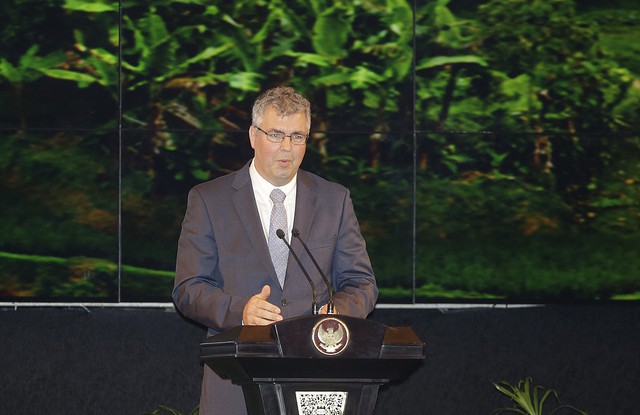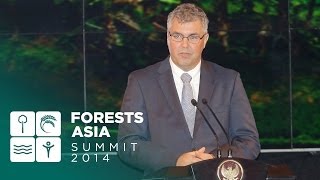
Editor’s Note: Peter Holmgren’s speech can be watched above. Check in at forestasia.org to see news updates from the Forests Asia Summit.
JAKARTA, Indonesia — The next 18 months represent a critical opportunity to inform global policy processes regarding climate change, sustainable development and green economy, said Dr. Peter Holmgren, Director General of the Center for International Forestry Research (CIFOR).
Delivering the opening address at the Forests Asia Summit in Jakarta, Dr. Holmgren discussed the importance of forest landscapes to each of those three processes.
One of the chief goals of the Summit, he told the nearly 2,000 people in attendance, was to initiate a dialogue between forestry and agriculture, between public and private, and between urban and rural.
“We must succeed — not only for the hundreds of millions who live in this region, but for the entire planet,” he said.
Dr. Holmgren closed by introducing the President of Indonesia, Susilo Bambang Yudhoyono, who delivered the keynote address. A transcript of the President’s speech can be read here.
A transcript of Dr. Holmgren’s speech follows.
Dr. Holmgren’s speech:
Your Excellency Dr. Susilo Bambang Yudhoyono, President of the Republic of Indonesia; Ambassadors and international representatives, Indonesian Ministers, Ministers from across Southeast Asia, Distinguished guests, Ladies and gentlemen —
Welcome to the Forests Asia Summit, led by my organization, the Center for International Forestry Research, and co-hosted by the Indonesian Ministry of Forestry.
It is a great privilege for me to welcome you all. Together, we can take this opportunity to make a difference.
Because our world is at a turning point. Decisions are to be made on the international arena over the next 18 months that may shape our common future for generations to come.
Forests and landscapes in Asia are a critical part of that future, in:
- Producing food
- Protecting the environment
- Progress in gender and social equity
- Providing opportunities for livelihoods, and
- Proceeding against climate change
These must all happen at the same time and often in the same places.
We must succeed with this. Not only for the hundreds of millions who live in this region, but for the entire planet.
I refer to three global policy processes and initiatives that are underway.
Over the next two days, we can show just how central — and integral — forests and landscapes are for making progress in these.
First, the post-2015 agenda and the Sustainable Development Goals:
The SDGs will be a reference point for our efforts for years to come.
Some are concerned that “forests” are not visible as a single goal, and fear that forests will receive too little attention.
I argue the opposite: We have, and must take, the opportunity to demonstrate that forestry contributes strongly to all development priorities
But for this to happen, sectors must work together to find combined landscape solutions.
That is why we want to see a dialogue between forestry and agriculture, between public and private, and between urban and rural.
Across the world, governments, businesses and consumers are beginning to change the way they operate — to make sure that the natural resources we draw from today are still there tomorrow
The second global priority is the next climate agreement.
The IPCC has just released its 5th assessment reports on climate change adaptation and mitigation.
The IPCC reports show us just how important are food systems and forest management. They show that adaptation and mitigation in the land-based sectors are a very big part of the solution.
We will learn more from Dr. Pachauri, the chair of the IPCC, in his keynote address tomorrow.
Later this year, the world’s climate negotiators meet in Lima for COP20 — a milestone towards a new climate agreement. We have the privilege of welcoming Peru’s Environment Minister Manuel Pulgar-Vidal, the incoming COP president, to speak at the Forests Asia Summit tomorrow.
And third —the Green Economy initiative.
Across the world, governments, businesses and consumers are beginning to change the way they operate — to make sure that the natural resources we draw from today are still there tomorrow.
But this requires a new way of thinking. New ways of leveraging capital and building rural economies. New ways of working together — again, across all the sectors in the landscape.
Green growth with equity, indeed, in my view, starts with sustainable investments in the landscape.
Let’s remember that forestry is a cornerstone of the Green Economy.
Each of these three ambitious aspirations relies on knowledge. Good decisions make good use of robust, reliable and relevant evidence, evidence that informs us not only about the state of knowledge, but also about options for action and the possible consequences of such actions.
CIFOR has delivered forestry research across Asia and the world for more than 20 years, together with many partners. We have built this Summit on the foundation of that research and partnerships.
We call on all of you today for your views on priorities and for your commitments to research on forests and landscapes to inform policy processes and business practices and to find the path, through investments, through dialogue, through research, towards a sustainable world.
Now, I would like to introduce someone who does not shy away from making and keeping commitments:
His Excellency, Susilo Bambang Yudhoyono, the President of the Republic of Indonesia.
Two and half years ago, at a conference similar to this one, President Yudhoyono announced that he would dedicate the remaining years of his term to the protection of his country’s forests.
Since that time, President Yudhoyono introduced a moratorium on new forest concessions
He formed a government agency dedicated to REDD+, a policy framework that aims to slow the rate of climate change through fewer emissions from forestry.
Since then, Indonesia changed its laws on indigenous peoples’ rights to customary forests.
During that time, President Yudhoyono has championed inclusive, green growth.
Also, during that time, President Yudhoyono co-chaired the high-level panel tasked with designing Sustainable Development Goals, and delivered the panel’s recommendations to the UN Secretary General.
Making commitments to green growth, equity and sustainability, and following them through, takes foresight, innovation and leadership.
Distinguished guests, Ladies and gentlemen, it is my honor to introduce His Excellency, the President of Indonesia, Susilo Bambang Yudhoyono.
We want you to share Forests News content, which is licensed under Creative Commons Attribution-NonCommercial-ShareAlike 4.0 International (CC BY-NC-SA 4.0). This means you are free to redistribute our material for non-commercial purposes. All we ask is that you give Forests News appropriate credit and link to the original Forests News content, indicate if changes were made, and distribute your contributions under the same Creative Commons license. You must notify Forests News if you repost, reprint or reuse our materials by contacting forestsnews@cifor-icraf.org.
